How to Navigate Being Wrapped Up in Social Media and Conspiracy Narratives that Run Counter to your Mission, Brand, and Success
At this point, we’re all familiar with the Ye (formerly known as “Kanye West”) saga and many of us have been reading or hearing about him in the news since the start of October. But, what hasn’t been covered is the corporate, reputation, and financial implications of scenarios like this in which a business partner, ambassador, or sponsor goes rogue. Over the last several months, Alethea has been conducting an investigation using Ye as a case study to analyze how information moves online within far-right and extremist communities and the potential corporate and business risks that could be facing brands across all industries.
The nuances of the online ecosystem are extremely complex, and some of the most important conversations – the conversations that allow brands and organizations to get out in front of narratives – are happening outside of Twitter and traditional media. We understand how information moves online, the cultural and behavioral distinctions, and the implications of where and how activity is occurring within these communities. This context is extremely important to understand the potential risks to business value and reputation, Environmental, Social, and Governance (ESG) efforts, and the physical safety of high-profile employees. The threat is too pervasive and the cost of inaction in these scenarios is too high. Brands facing crises, like the ones outlined in this case study, can incur costs and losses of up to $10 million dollars related to market capitalization and shareholder value, increased physical security, and brand and reputation recovery.
The case of the Ye saga is a revealing example of what happens when high-profile brands and individuals get wrapped up in social media narratives and conspiracy theories that lead to calls for boycotts, potential stock or financial manipulation, and major impacts to customer bases. What do you do when your company is being criticized and threatened in conspiracy communities? How do you even know it’s happening? Eliminating risk isn’t an option – but mitigating your exposure is. Alethea can provide companies and corporate leaders with the necessary insights to help them deal with situations like this. We aim to help companies control and contain the false narratives and activity that runs counter to their mission, brand, and success.
Conceptualizing Business Risk and Risk Assessment
Since his October 3, 2022 appearance in a “White Lives Matter” shirt, Ye appeared on TV and radio interviews, podcasts, and other forms of media where he continued to spread antisemitic hate and conspiracies. His comments and actions contributed to an increase in the online use of certain antisemitic phrases and conspiracies -- such as #TheNoticing -- alongside references to brands that have distanced themselves from Ye – conversations and content that pose significant risk to brands.[1] The most popular narratives we observed were conspiracies alleging that Jewish people control major brands, posing risks to corporate executives personal brands and physical safety, as well as calls to boycott brands that severed ties with Ye.
In recent years, corporate brands have been asked to lead in a new way. Commitment to ESG is important and consumers reward brands they feel are ethically, socially, and morally responsible. When it comes to public trust, corporations are beginning to rise above the government and its institutions, putting increasing pressure on them to wade into political, social, and cultural issues. Within the ensuing conversations around how to respond to Ye's statements, companies and brands were stuck between a rock and a hard place. Inaction is not an option and time is incredibly valuable, especially when facing dynamic and fast-moving threats to their customer base, loss of revenue, and threats of violence towards employees and executives. Considering what’s at risk, it’s important that leaders see the risks of weaponization of brands and information as strategic priorities they must own.
At Alethea, we conceptualize business risk exposure in a way that separates risk assessment into different layers. This allows for what we call a “whole of internet approach” as well as highlights what differentiates Alethea from a competitive standpoint. The first layer is traditional social listening tools, that you may be able to ingest from what your corporate communications team uses to track news and conversations on sources like Twitter. Unfortunately, this is insufficient in understanding true business risk, and often leaves companies blindsided. Analyzing business risk in this layer is often fruitless because monitoring brand mentions solely on mainstream social media platforms doesn’t give a company time to take any meaningful action. If you’re trending on Twitter, the damage has already been done.
Alethea specializes in understanding alternative and niche platforms, online communities, conspiracy theories, forums, blogs, and news from non-traditional news sources. Having early insights into these ecosystems can support early identification of risk. These insights enable us to support our Clients in determining the narrative origin, risk level, and steps that can be taken to proactively mitigate a crisis before it starts. Our comprehensive approach guided by subject matter experts allows Alethea to provide customers with important context to help leaders determine the best course of action – whether led by communications, legal, or security teams. Detecting risk and threatening narratives in a proactive manner is what’s most important because in the case of a crisis, having time on your side can potentially save you millions of dollars.
What are the Risks?
One of the key concerns for businesses is how to know when their brand, assets, or high-profile employees are being discussed in online conspiracy and extremist communities. In recent years, we have observed a fragmentation of the information space, meaning that the number of platforms, forums, and networks in which threat actors operate has significantly increased. Although the mainstream conversation eventually died down, we are still actively seeing mentions of Ye alongside references to brands on fringe platforms. Long story short, if you’re just monitoring Twitter for negative or concerning mentions of your brand, you will miss the real threats and the time to act will have passed.
Government Affairs & Regulation
In the case of Ye, we observed content from Members of Congress and political influencers, on both fringe and mainstream social media platforms, voicing support for his actions and condemning the public backlash. The average consumer, shareholder, or corporate leader may dismiss support for Ye by a Member of Congress as nothing more than typical political opportunism by commenting on a high-profile event or issue - but they’d be missing the point. The point is that the politicians that supported Ye are in a position to regulate the businesses and companies that – due to their adoption of conspiracy theory narratives they believe have unfairly severed ties with Ye – don’t believe in freedom of speech, are corrupt, and have attempted to take down a “successful black man.”[2] With politicians seeking to investigate or take action against companies with strong ESG practices, particularly as seen in cases of West Virginia and Kentucky restricting state business to financial institutions, we expect that this trend will begin to occur on the national level as well. Insights into the political and regulatory implications of corporate activity, like forming a business partnership with a controversial public figure, or a brand crisis can provide important context for companies to navigate this shifting reality while keeping their business practices in line with their values. Consumer-focused brands must understand how false narratives, mentions of their business or employees, and activity within the online ecosystem can have direct and consequential real-world impacts on their reputation, license to operate, stock and shareholder value, and customer base.
Physical Safety
In the wake of Ye's offensive comments and actions, many of his corporate affiliations decided to cut ties and drop him as a sponsor. It’s important to understand the explicit nature in which brands and companies were being criticized within these far-right and conspiracy communities. Users and posts were very clear, creating antisemitic conspiracy theories that explicitly called out brands like Adidas, Balenciaga, Nike, Spotify, and JPMorgan, among others. The Jewish board members of Skechers even had their names advertised on Gab, a platform known for hosting right-wing extremist content, implying that Jewish people are the reason for Ye's business mishaps and supporting the widespread antisemitic conspiracy theories spread by Ye.[3]
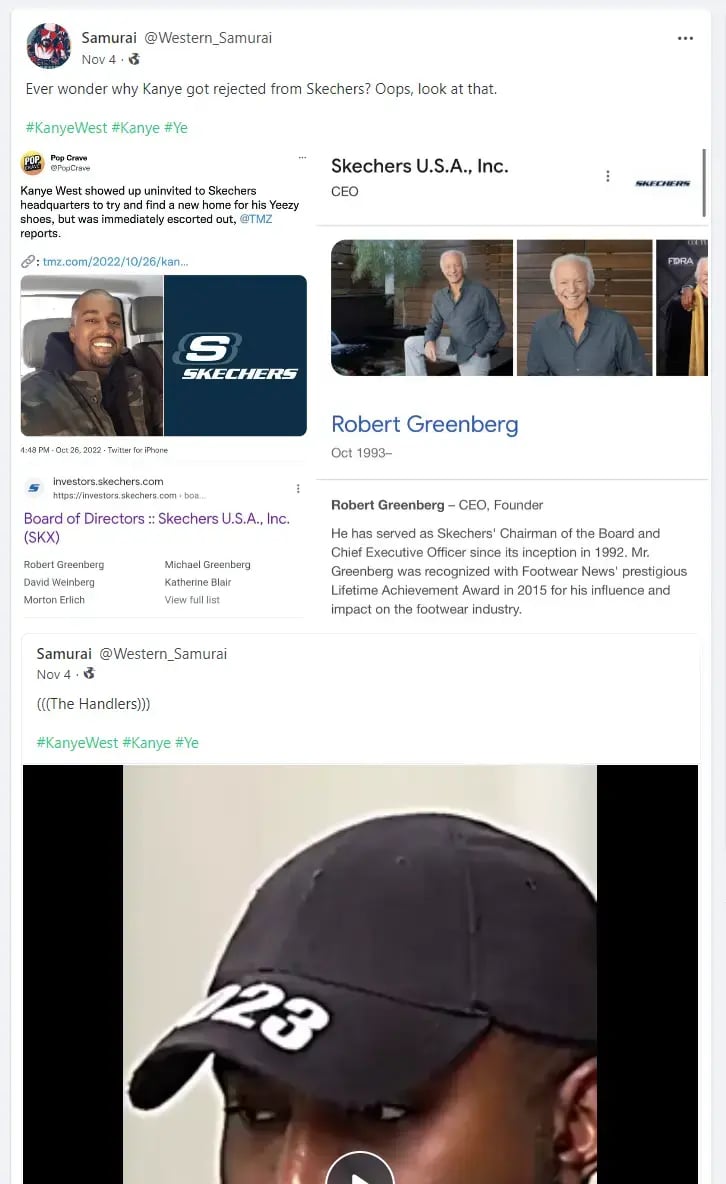
In another example, a Gab user shared a screenshot of a TikTok video showing Nike CEO Mark Parker, calling to boycott Nike and its products because they are child predators and satanists.[4]
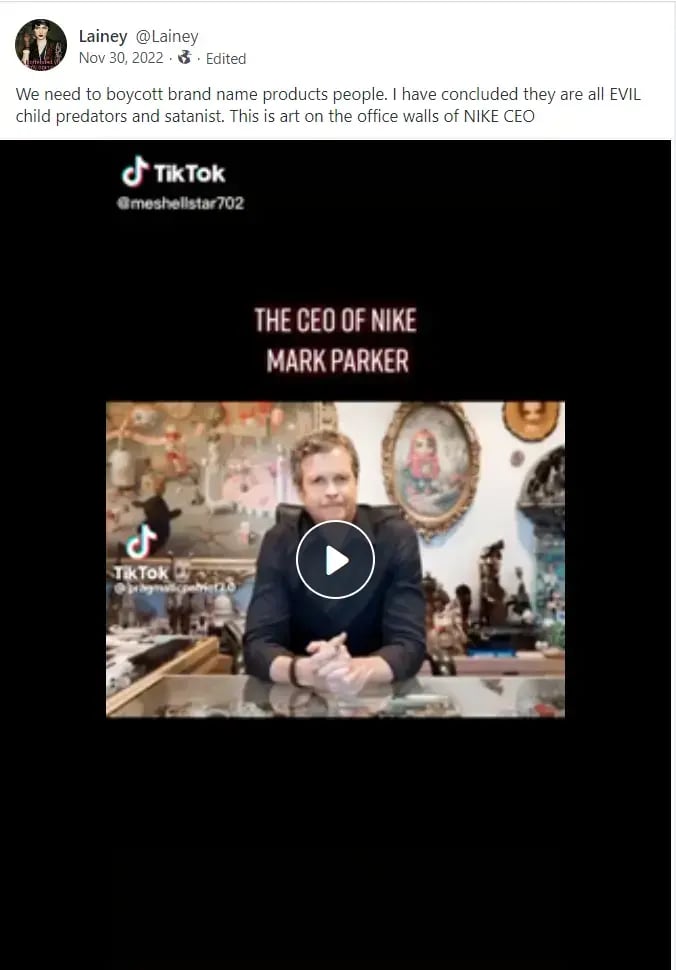
Although this Nike example isn’t directly related to the Ye saga, the activity is occurring in the same extremist communities and by the same individuals and influencers. Antisemitic rhetoric and conspiracy theories and claims of a secret cabal of pedophiles and satanists running American society are common narratives observed in these communities. In the Ye saga, what’s more concerning from a business perspective is that brands and employees are being mentioned where the implication associated with the posts is harm. Businesses have to be aware of the physical safety risks to their high profile employees. Proactive monitoring and the proper insights can be the reason your company avoids potentially dangerous situations for its employees and catches a boycott campaign before it's too late.
Boycotts
In addition to antisemitic conspiracy theories and generalized criticisms of brands, we observed numerous calls to boycott the companies that distanced themselves from Ye. After Adidas ended their partnership with Ye on October 25, there was a significant increase in the criticism of their decision on fringe social media platforms and calls for boycotts of the brand entered mainstream social media communities in early November. As highlighted by the example below, the rhetoric and sentiment of the posts focused on how brands were disrespecting the Black community and called for unity and support for Ye.
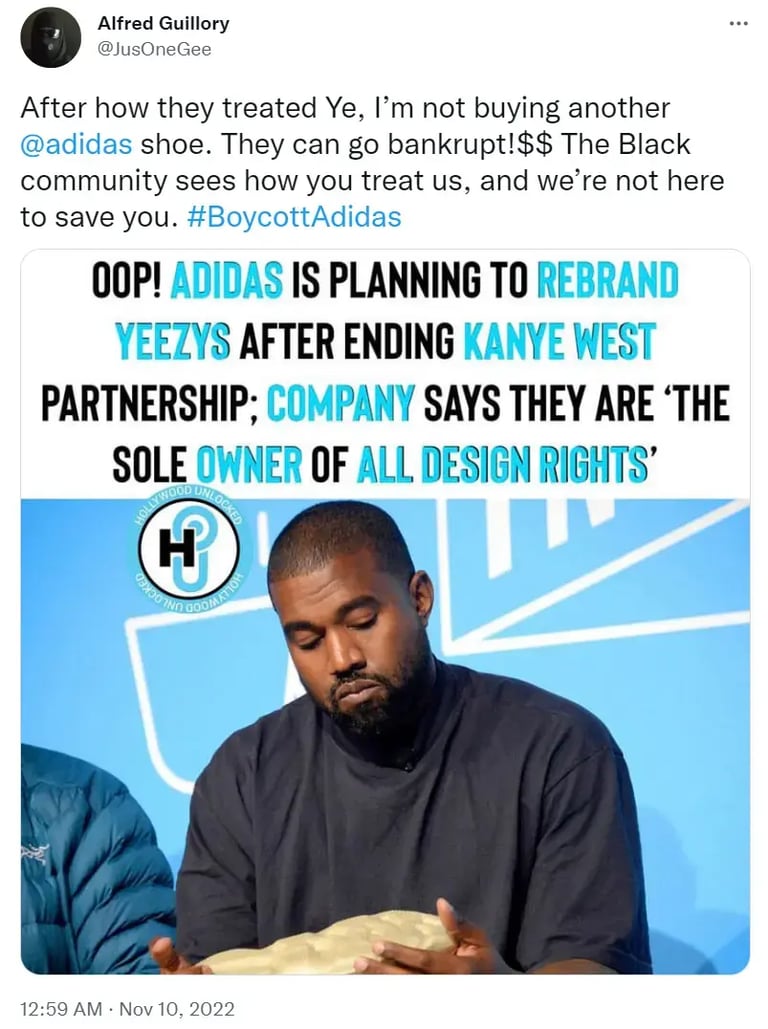
Calls for boycotts, especially within the context of the Ye saga and occurring within known conspiracy and extremist communities, can be a sign of coordinated activity attempting to cause harm to the mentioned brands and companies. It’s critical that brands do not underestimate the power of high profile influencers and communities with hundreds of thousands of passionate members.
Shareholder, Stock Price, and Financial Stability
We know that brand and reputation crises stemming from disinformation or social media manipulation have financial implications, specifically in the case of stock and shareholder value. The Ye saga was no different. Prior to ending their partnership with Ye, and as public outcry of their lack of response intensified, Adidas stock dropped 19% between his appearance in a “White Lives Matter” shirt (October 3, 2022) and Adidas finally ending their partnership (October 25, 2022). Articles in Forbes and the New York Times reported that Adidas stood to lose $650M and was forced to lower their earnings forecast after dropping Ye and the Yeezy line.[5][6]
What should be more concerning to CEOs and CCOs is that we also observed discussion of the same brands in popular conspiracy and stock-manipulation communities, such as Reddit’s r/wallstreetbets with 13.2 million members and r/conspiracy with 1.9 million members.

Users were encouraging others in the communities to pull their money out of companies like Nike, JPMorgan Chase, and Adidas, suggesting that the stock price would take a hit due to the controversy with Ye. A popular phrase within conspiracy communities has been “Go Woke, Go Broke,” suggesting that companies who support “woke” policy decisions, like cutting ties with Ye, were going to lose money.

Fueled by an increase in retail investing and the popularity of communities like r/wallstreetbets, the trend of meme stocks and coordinated stock manipulation is here to stay. Although we observed no coordinated activity or manipulation in the Ye case, corporate leaders and shareholders must understand the business implications of being discussed in communities where short-seller and pump and dump activity often originates. Alethea’s proactive monitoring can often catch new conspiracies at the first post and assess the risk of the activity, helping you mitigate the situation before it becomes a brand and business crisis.
The Cost of Inaction
Business leaders and decision makers should look at the Ye saga with concern. Do you have the structures or processes in place to deal with a similar crisis? Companies have unique assets in the form of reputational value, high-profile employees, and customer bases – do you know which of your assets are vulnerable? If you don’t understand the threats, then you won’t be able to properly protect your brand. Consumers, employees, and shareholders have higher expectations for brands to demonstrate a commitment to ESG, corporate responsibility, and moral and ethical values. When we speak with corporate leaders and boards, we find there is a false sense of security in that they think the government protects them against digital threats. The Ye saga has highlighted the risks facing companies in our current digital reality with an online ecosystem where false and damaging information moves rapidly. The costs of brand crises stemming from disinformation, false narratives, and social media manipulation involve losses to market capitalization, increases physical security and safety costs, reputation management, and brand value.
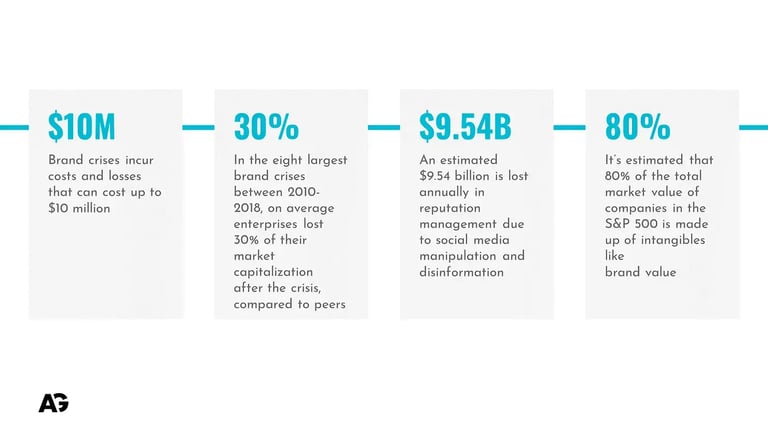
Alethea can provide companies and corporate leaders with the necessary insights to help them deal with situations like this and avoid a brand crisis situation that can cost up to $10 million. As demonstrated by our comprehensive and holistic approach, simply monitoring for mentions of your brand or high-profile employees on mainstream social media is not enough. We can catch conspiracy and extremist activity at the first post, not waiting until it trends on Twitter to be able to alert you to when your brand is being boycotted or the names of your board members and their families have been identified in communities known for promoting extremist content and activity. With our proactive insights, we aim to help companies control and contain the false narratives and activity that runs counter to their mission, brand, and success.
Footnotes:
[1] The hashtag “#TheNoticing” spiked on November 5, 2022 with 4,716 total mentions, and has since experienced a second (smaller) increase in mentions with 1,792 mentions on November 13, 2022
[2] https://www.minds.com/newsfeed/1434857456059551764
[3] https://gab.com/Western_Samurai/posts/109285604029008326
[4] https://gab.com/Lainey/posts/109434700727660523
[5] https://www.forbes.com/sites/dereksaul/2022/10/25/adidas-stock-drops-6-as-company-takes-247-million-loss-on-kanye/?sh=4fa160634768
[6] https://www.nytimes.com/2022/11/09/world/europe/adidas-earnings-yeezy.html?smid=url-share
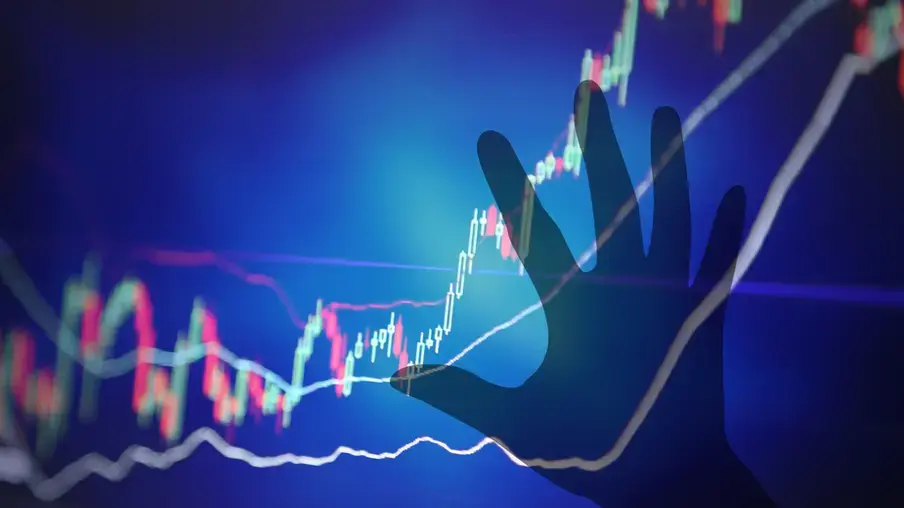


.png)

